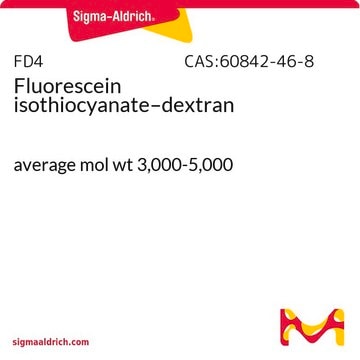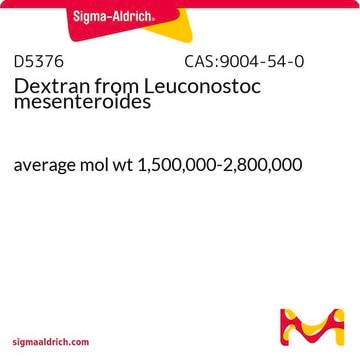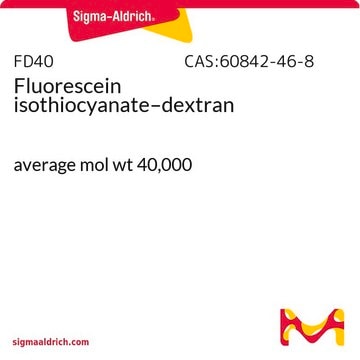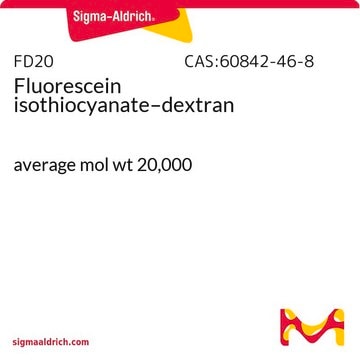52471
Fluorescein isothiocyanate–dextran
average mol wt 2,000,000
Synonym(s):
FITC–Dextran 2000, FITC–Dextran
Sign Into View Organizational & Contract Pricing
All Photos(1)
About This Item
Recommended Products
biological source
synthetic
Quality Level
conjugate
FITC conjugate
form
powder or crystals
mol wt
average mol wt 2,000,000
extent of labeling
0.001-0.020 mol FITC per mol glucose (substitution)
fluorescence
λex 493 nm; λem 520 nm in 0.1 M Tris pH 8.0
application(s)
cell analysis
Looking for similar products? Visit Product Comparison Guide
Application
Dextran labeled with fluorescein isothiocyanate for possible use in perfusion studies in animals.
Fluorescein isothiocyanate–dextran (FITC–Dextran 2000) is use as a fluorescent probe to study the permeability of structures such as intercellular junctions involved in processes such as hearing and vascular permeability and the integrity of the blood brain barrier (BBB).
Signal Word
Warning
Hazard Statements
Precautionary Statements
Hazard Classifications
Eye Irrit. 2 - Skin Irrit. 2 - STOT SE 3
Target Organs
Respiratory system
Storage Class Code
11 - Combustible Solids
WGK
WGK 3
Flash Point(F)
Not applicable
Flash Point(C)
Not applicable
Choose from one of the most recent versions:
Already Own This Product?
Find documentation for the products that you have recently purchased in the Document Library.
Customers Also Viewed
Sung Ji Ahn et al.
Biomedical optics express, 11(5), 2665-2678 (2020-06-06)
We show that third harmonic generation (THG) microscopy using a 1-MHz train of 1,300-nm femtosecond duration laser pulses enabled visualization of the structure and quantification of flow speed in the cortical microvascular network of mice to a depth of >
Elodie Debefve et al.
Lasers in surgery and medicine, 43(7), 696-704 (2011-11-08)
Photodynamic therapy (PDT) affects vascular barrier function and thus increases vessel permeability. This phenomenon may be exploited to facilitate targeted drug delivery and may lead to a new clinical application of photodynamic therapy. Here, we investigate the role of leukocyte
Sangmi Ock et al.
Biochemical and biophysical research communications, 516(2), 350-356 (2019-06-19)
Receptor activator of NF-κB ligand (RANKL) is a member of the TNF superfamily. RANKL increases endothelial permeability and induces angiogenesis, suggesting its critical roles in the vasculature. Despite the evidence implicating RANKL in vascular pathology, its role in ischemic retinopathy
Albert Y Jin et al.
BMC neuroscience, 11, 12-12 (2010-02-04)
The link between early blood- brain barrier (BBB) breakdown and endothelial cell activation in acute stroke remain poorly defined. We hypothesized that P-selectin, a mediator of the early phase of leukocyte recruitment in acute ischemia is also a major contributor
Mercy Afadzi et al.
IEEE transactions on ultrasonics, ferroelectrics, and frequency control, 60(1), 21-33 (2013-01-05)
The mechanism involved in the ultrasoundenhanced intracellular delivery of fluorescein-isothiocyanate (FITC)-dextran (molecular weight 4 to 2000 kDa) and liposomes containing doxorubicin (Dox) was studied using HeLa cells and an ultrasound transducer at 300 kHz, varying the acoustic power. The cellular
Our team of scientists has experience in all areas of research including Life Science, Material Science, Chemical Synthesis, Chromatography, Analytical and many others.
Contact Technical Service











